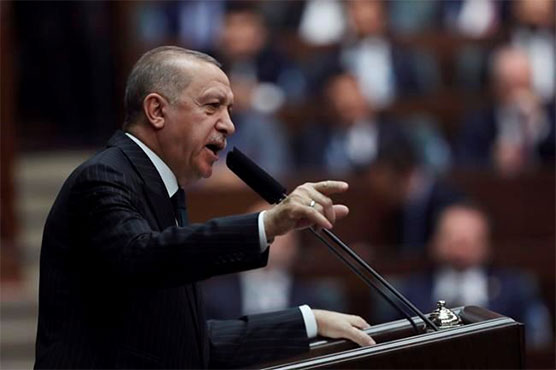Turkey rejects accusations of using migrants to 'blackmail' EU

Turkey on Wednesday rejected accusations by the European Union that it was "blackmailing" the bloc.
ANKARA (AFP) - Turkey on Wednesday rejected accusations by the European Union that it was "blackmailing" the bloc after Ankara opened its borders to refugees seeking to flee to Europe.
As thousands of desperate refugees gathered on Turkey s border with European Union member Greece, some EU states and the bloc s migration commissioner have accused Turkey of using migrants as a bargaining chip with Brussels to get support for its operations in Syria.
"We have never seen refugees as a means of political blackmail," Turkish presidential spokesman Ibrahim Kalin said during a press conference in Ankara.
"Our objective by opening the doors was not to create an artificial crisis, to place political pressure or to serve our interests," Kalin added.
He said Ankara did not wish to force anyone to stay in Turkey, which is home to around four million refugees, mainly Syrian.
"Turkey s capacity has a limit," he added, urging Brussels to fulfil the promises it had made to Ankara under the 2016 EU-Turkey agreement to prevent the flow of migrants.
Migrants have massed at the Turkish-Greek frontier since Turkish President Recep Tayyip Erdogan said no migrant or refugee would be prevented from leaving Turkey if they wished to do so.
Earlier on Wednesday, the EU promised an additional 170 million euros in aid for vulnerable groups in Syria.
But Kalin said Brussels needed to "produce a road map" of the management of the funds.
The issue came to a head after more than 30 Turkish soldiers were killed in Syrian regime fire in rebel-held Idlib in northwestern Syria where an assault by Damascus backed by Russian air power has killed hundreds and displaced nearly a million people.
Erdogan will go to Moscow on Thursday for talks with Russian counterpart Vladimir Putin which the Turkish leader earlier said hoped would end in a ceasefire in Idlib.
Kalin said the two leaders would "discuss in detail what steps to take in Idlib" as Ankara sought to pressure Moscow to force the regime to stick to a 2018 agreement.
Under the Turkey-Russia deal, Turkey established 12 observation posts in Idlib.
Despite being on opposite sides of the Syrian war, Turkey and Russia have worked closely, especially on Idlib but the escalating violence has strained relations.
"We have broad relations and we re hopeful as we go to (Russia)," Kalin said.

